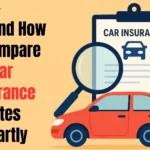If you run a vehicle-dependent business, then having business car insurance becomes a must for you. However, if it is your first time opting for such insurance, you may be clueless about the know-how.
On top of that, unlike personal vehicle insurance, commercial auto insurances are highly customizable. And that makes it even more confusing for some to curate policies that give optimal coverage.
So if you own an SME and want to pay less and get more on your business car insurance, implement the tips that I mentioned here.
Business Car Insurance: Who Needs That?

Before looking for business car insurance strategies, it is crucial to understand who is the ideal buyer of such a policy. Suppose you own a business that heavily relies on on-road vehicles like delivery cars, vans, and trucks. In that case, you should invest in a business car insurance policy.
No matter if you own the vehicle or not, if it is used for business purposes, it has to be insured through business car insurance, as personal car insurance doesn’t cover them. But after knowing the benefits of this insurance policy, you might consider it as an additional benefit.
As these policies are often very flexible and provide your business vehicle with optimal coverage. For example, even if your employee is using their personal vehicle for business purposes, you can cover it through business auto insurance. But there will definitely be some terms and conditions to them.
Luckily if your business is based in Illinois, you can look for cheap liability car insurance in Illinois online and get the best deals.
Tips to Get The Most Out Of Your Business Car Insurance
Try implementing as many strategies as possible to curate the ultimate coverage plan for your business vehicles.
1. Evaluate Your Coverage Needs and Risks
Business car insurances provide a range of facilities, starting from basics like liability coverage and collision coverage to more specific ones like underinsured motorist coverage and non-owned auto coverage.
Depending on the risk associated with your business vehicle operations, you may only require a few of them. So first, understand what risks your business vehicle can run into, and then pick coverages accordingly.
2. Bundle Your Policy With Other Business Policies
Bundling your business car policies with your other business policies can provide multiple benefits, such as discounts, streamlined coverage management, and easy billing.
Some of the most common business insurance policies that people choose to merge with their business car policies include,
- General liability insurance
- Commercial property insurance
- Business Owner’s Policy (BOP)
- Professional liability insurance
- Worker’s compensation insurance
However, the option to add your business insurance with your business car insurance depends upon your insurance provider. But these business insurances are generally accepted.
3. Keep Your Deductibles High
It is always a good idea to keep your deductibles high. The higher your deductibles, the lower your premium will be. So if you can not afford to pay high premiums right now, you can adjust that by increasing your deductibles.
You are keeping your deductibles high means you are choosing to take a large portion of your financial responsibility in the event of a claim before your insurance coverage kicks in.
However, ensure that you are not setting your deductibles unreasonably high in the quest to save money, as it can become an issue if you cannot manage the amount while filling claims.
4. Go For Higher Liability Limits
Along with keeping your deductibles high, keep your liability limits high too. Liability limits are the maximum amount that your insurance policy will pay in case of an accident. So, the higher the liability limit, the safer your business will be.
However, if you are unsure of how high your liability limits should be, you need to first evaluate how prone your business is to different risks. On that note, every state has a minimum liability limit, so ensure whatever limit you are setting is higher than the state’s minimum requirement.
5. Choose The Best Suited Payment Method
Changes in your payment method can also help you get a business car insurance policy that best suits your needs. You can choose to pay the entire premium, which can help you save on administrative fees or other interest charges.
Otherwise, you can choose automatic payments, for which some policy providers might give you a discount or reduce the fees. Choosing automatic payment through EFT or cards also ensures that your premiums are paid on time, and you avoid any late payment penalties.
Lastly, you can also customize your billing cycle according to your cash flow. You can avail of annual, semi-annual, quarterly, or monthly options. Choosing a longer billing cycle results in lower administrative fees.
6. Regularly Review And Update Your Coverage
With a growing business, the risks and needs associated with your business vehicles might also change. So it is essential that you review and revise your business auto insurance policies periodically.
7. Add Risk Management Practices To Your Business
Insurance companies often give additional discounts to businesses that implement various risk management practices in their businesses. Having multiple risk management practices shows the policy providers that you are proactive in minimizing potential losses and accidental damages.
Some practices that can help you include driver training programs, GPS tracking systems or even regular vehicle maintenance. So if you do all or any of them, don’t forget to mention them while deciding policy prices.
8. Look For Additional Endorsements
Based on the type of your business, you might need specific endorsements. For example, the hired and non-owned auto coverage extends the liability protection to vehicles that are not owned by you but are used for your business purposes.
So if you want optimal coverage, you must consider such endorsements.
Final Thoughts
Creating an optimal business car policy is highly variable and entirely depends on your business needs. First, analyze your business and identify the potential risks associated with your business vehicle. And then, convey them clearly to your policy agent to come up with a coverage plan that is customized to your business and hence is the perfect one for you.








